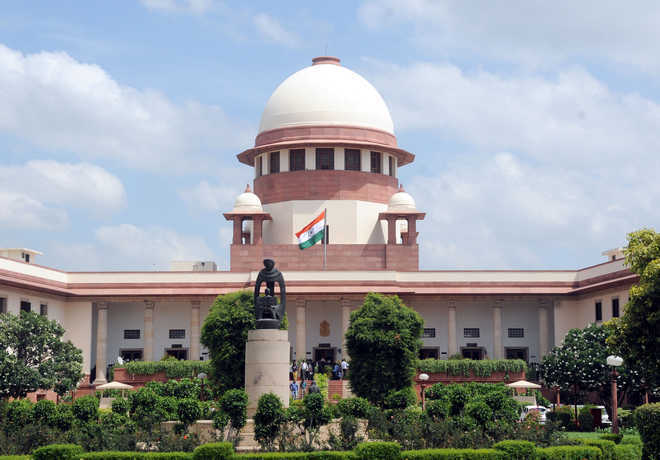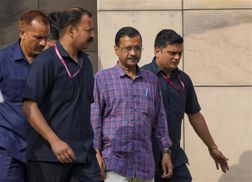
A five-judge Constitution bench, headed by Chief Justice Dipak Misra, said that citizens had a right to be informed about the antecedents of their candidates. Tribune file
Satya Prakash
Tribune News Service
New Delhi, September 25
Displaying judicial restraint, the Supreme Court on Tuesday refrained from debarring politicians facing serious criminal charges from contesting polls and instead left it to Parliament to enact a law to rid Indian politics of criminals.
"In a multi-party democracy, where members are elected on party lines and are subject to party discipline, we recommend to Parliament to bring out a strong law whereby it is mandatory for the political parties to revoke membership of persons against whom charges are framed in heinous and grievous offences and not to set up such persons in elections, both for the Parliament and the State Assemblies," a five-judge Constitution Bench headed by Chief Justice Dipak Misra said dismissing a PIL that wanted the top court to debar politicians against charges had been framed in connection with a heinous crime.
"This, in our attentive and plausible view, would go a long way in achieving decriminalisation of politics and usher in an era of immaculate, spotless, unsullied and virtuous constitutional democracy," said the Bench, which also included Justice RF Nariman, Justice AM Khanwilkar, Justice DY Chandrachud and Justice Indu Malhotra.
"The nation eagerly waits for such legislation, for the society has a legitimate expectation to be governed by proper constitutional governance," it said.
"The judicial arm of the State being laden with the duty of being the final arbiter of the Constitution and protector of constitutional ethos cannot usurp the power which it does not have," it said.
Discussing the Vohra Committee report on criminalisation of politics, Law Commission's 244th report on Electoral Disqualifications and its own verdicts on electoral reforms, the Bench expressed serious concern over criminalisation of politics in India.
On the extent of criminalisation that has pervaded Indian politics, the top court cited a Law Commission report that said in the 10 years since 2004, 18% of the candidates contesting either National or State elections have criminal cases pending against them (11,063 out of 62,847).
"The country feels agonised when money and muscle power become the supreme power. Substantial efforts have to be undertaken to cleanse the polluted stream of politics by prohibiting people with criminal antecedents so that they do not even conceive of the idea of entering into politics. They should be kept at bay," the top court said.
However, the Bench directed a tainted candidate to fill up particulars about his/her criminal antecedents in bold letters while filing nomination paper and asked his/her political party to put out such information on its website and give to enable voters to take an informed decision.
"The candidate as well as the political party concerned shall issue a declaration in the widely circulated newspapers in the locality about the antecedents of the candidate and also give wide publicity in the electronic media. When we say wide publicity, we mean that the same shall be done at least thrice after filing of the nomination papers," the Bench ordered.
"These directions ought to be implemented in true spirit and right earnestness in a bid to strengthen the democratic set-up," the Bench said.
The verdict came on a PIL filed in 2011 by Public Interest Foundation which demanded debarring politicians facing serious criminal charges in order to de-criminalise Indian politics.
"We are sure, the law making wing of the democracy of this country will take it upon itself to cure the malignancy. We say so as such a malignancy is not incurable. It only depends upon the time and stage when one starts treating it; the sooner the better, before it becomes fatal to democracy," it said.
"Though criminalisation in politics is a bitter manifest truth, which is a termite to the citadel of democracy, be that as it may, the Court cannot make the law," said the top court which has ushered in several electoral reforms in the past 15 years, including immediate disqualification of lawmakers on conviction and introduction of NOTA.
Calling for infusing a culture of purity in politics and nurturing an informed citizenry which decides the fate and course of politics, the Bench said complete information about criminal antecedents of candidates formed the bedrock of wise decision-making and informed choice by the citizenry. Informed choice was the cornerstone of a pure and strong democracy, it said.
During the hearing, Attorney General KK Venugopal had told the Bench not to cross the 'Lakshman Reka' and respect the constitutional scheme on separation of powers between the Legislature, the Executive and the Judiciary. Article 102 provided for Parliament to make law on the issue and hence the top court should leave it to the wisdom of the parliamentarians, Venugopal had said opposing the petitioners' contention that the top court was entitled to issue proper guidelines in view of Parliament's failure to enact a law to check criminalization of politics in India.
Noting that it has issued the directions with "immense anguish" as the Election Commission could not deny a candidate to contest on a party symbol, the Bench said: "A time has come that the Parliament must make law to ensure that persons facing serious criminal cases do not enter into the political stream.
"It is one thing to take cover under the presumption of innocence of the accused but it is equally imperative that persons who enter public life and participate in law making should be above any kind of serious criminal allegation. It is true that false cases are foisted on prospective candidates, but the same can be addressed by the Parliament through appropriate legislation," the top court said.



























